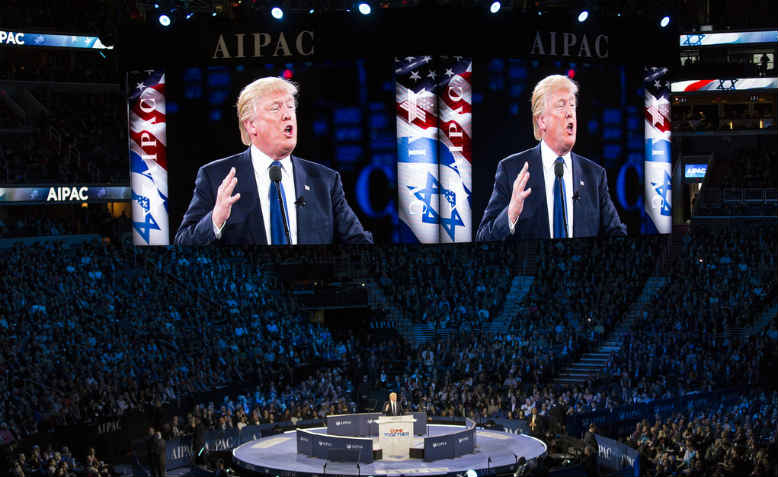 Trump addresses AIPAC. Photo:Flickr/Lorie Shaull
Trump addresses AIPAC. Photo:Flickr/Lorie Shaull
Trump and Netanyahu usher in a new level of US-Israel cooperation, but as far right antisemitism grows the narrative cracks argues Shabbir Lakha
Netanyahu has called his recent meeting with Donald Trump “a new day” for Israel-US relations. For the rest of us, the press conference was more a combination of bizarre and sinister. It was a grotesque show of mutual adulation, Netanyahu’s usual Islamophobic and anti-Palestinian rhetoric and Trump’s own brand of diplomacy.
In response to a question on his vision for peace in the Middle East – including his position on the two state solution, annexation of parts of the West Bank and unrestricted settlement construction, Trump said:
I thought for a while the two-state looked like it may be the easier of the two. But honestly, if Bibi and if the Palestinians — if Israel and the Palestinians are happy, I’m happy with the one they like the best.
Apart from the shock realisation that a solution will have to be one approved by both sides and Trump’s usual self-aggrandising, his nonchalant response betrays his cluelessness on how to navigate international relations. But this naivety is more dangerous than ridiculous when you’re the President of the United States setting out you’re administration’s position on matters of international law and stability.
Settlements
Since Trump’s inauguration, the Israeli government have authorised 6,000 new settlement units and the Knesset passed a law that retroactively legalises thousands of settler outposts in the West Bank that were illegal even under Israeli law. The aggressive ramping up of Israel’s settlement and house demolition policy comes after the passing of the United Nations Security Council resolution condemning Israeli settlements as a violation of international law.
Trump criticised the resolution and it has since been revealed that his former national security advisor, Michael Flynn, made a “vigorous diplomatic bid” to convince members of the UNSC to vote against the motion, even though Obama was still in office. When asked about settlements during the press conference, Trump turned to Netanyahu and casually said:
As far as settlements, I’d like to see you hold back on settlements for a little bit. We’ll work something out. But I would like to see a deal be made. I think a deal will be made.
In an attempt to show that this diplomacy works, Netanyahu yesterday backtracked on plans to build a new settlement in the West Bank, saying: “we need to focus now on coordinating with Trump on the issue of Iran.” In reality, this is hardly a dent in Israel’s settlement policy and shows how serious the anti-Iran alignment of Trump and Netanyahu really is.
Antisemitism
Since the creation of the State of Israel, there has been a paradoxical narrative on the relationship between Jewish people and Israel. Because Israel is a ‘Jewish State’, criticising Israel is antisemitic, but at the same time to assume a Jewish person has a view on or relation to Israel is antisemitic.
During the recent smear on Jeremy Corbyn and the left, both narratives played out simultaneously somehow and we were apparently guilty of both at the same time.
In the US, the bedrock of support for Israel and home of the largest Israeli lobby, Trump’s presidency is making this paradox more visible and the narrative more fragile. As the far right feel more legitimised there are Swastikas turning up and Synagogues and Jews are under attack. At the same time, Donald Trump’s chief strategist is overtly antisemitic and Trump fails to mention Jewish people on Holocaust Memorial Day.
Their defence? Sean Spicer says Trump “went out of his way” to recognise the Holocaust and – crucially – that obviously Trump is not antisemitic because he’s Israel’s best friend. Netanyahu himself stepped in to say “there is no greater supporter of the Jewish people and the Jewish state than President Donald Trump” when Trump sidestepped a question on antisemitism.
This has two effects:
1 The idea that criticising Israel is antisemitic but fuelling the far right that are actually perpetrating hate crimes against Jewish people isn’t is crystallising rapidly for a lot of Jewish people. Netanyahu and Zionists like Dershowitz and Trump’s Ambassador to Israel, David Friedman, making excuses for Trump and willing to work with him will only serve to solidify this understanding.
2 Islamophobia has long run rampant in pro-Israeli propaganda. But the far right who are attacking Jews are also carrying out attacks against Muslims. When ordinary Muslims and Jews are protecting and defending each other but the Israeli government is singing praises of the man instigating the attacks on both communities, that builds a solidarity that defies the propaganda.
One of the greater successes of the BDS movement has been the growing number of Jewish people separating themselves from the idea of Israel, particularly young people. This is only going to increase thanks to Trump.
On both sides of the Atlantic, Palestine solidarity activists and the left need to be ahead of the curve in organising and making the crucial arguments – particularly in this year of three significant anniversaries relating to Palestine.

